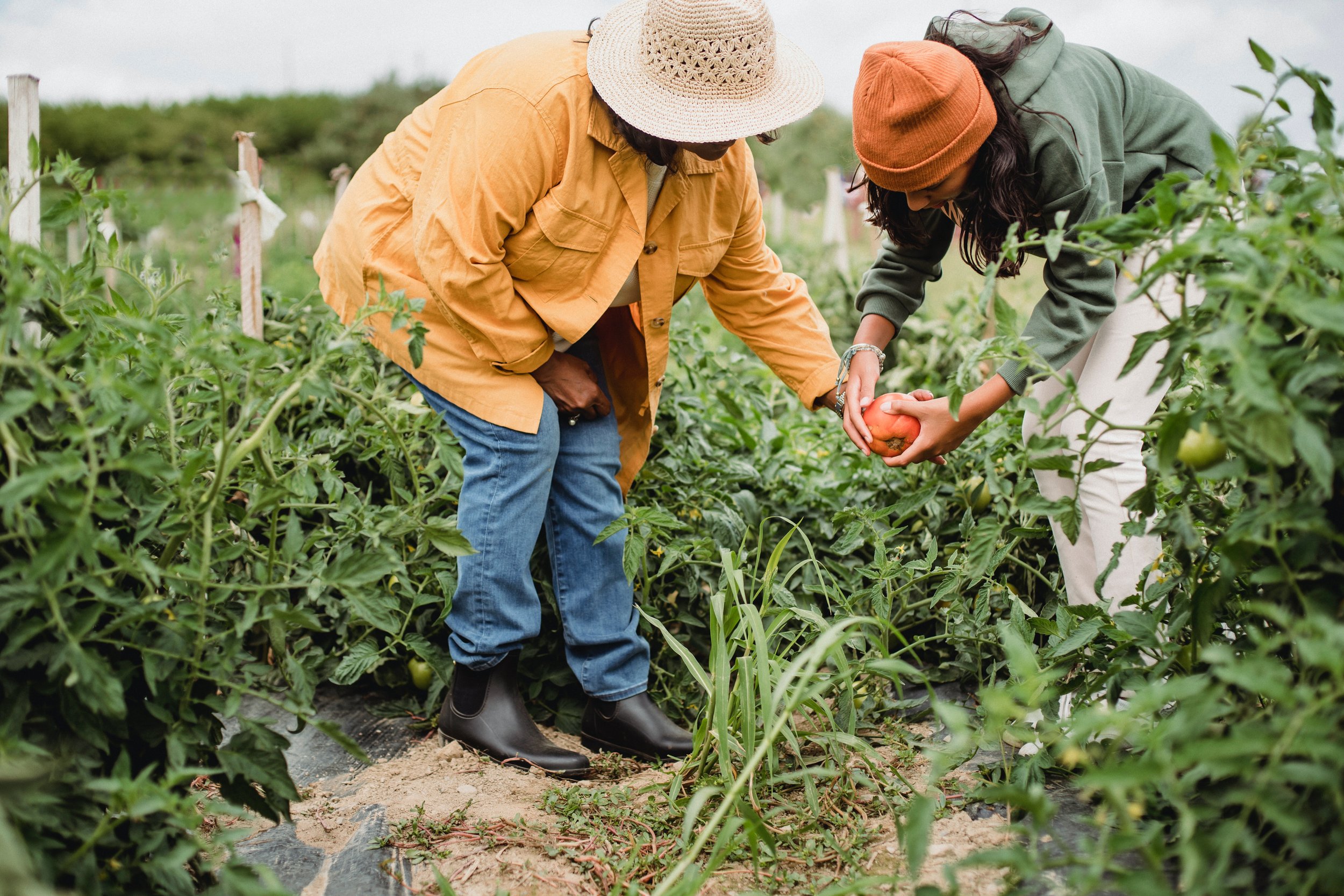
Community-Led
Food Systems
C A S E S T U D Y
A collaboration with Community Food Navigator to understand the challenges of BIPOC farmers and urban growers in the Chicagoland area and establish a framework to create a racially equitable food system.
S E E K I N G
D E E P E R U N D E R S T A N D I N G
O F T H E N E E D
Research Question
How might we co-create a racially equitable Chicago region food ecosystem?
“BIPOC and small-mid sized scale producers are at an even bigger disadvantage due to misperceptions about quality, value of BIPOC operations, and increased challenges in accessing capital investments to support growth and/or operational systems building.”
— Workshop Participant
Visions & Principles
W H A T W E C O - C R E A T E D
The learnings from our 1:1 interviews and workshops led to designing a list of visions and principles that could shape Navigator’s focus. Contributors include a mix of urban growers and food producers, social enterprise and small business leaders focused on community and economic development, people working in policy, human services, food security, public health, academia, mutual aid, community gardens, and high school youth in farm training programs.
Visions are overarching aspirations of an organization: what it hopes to achieve or to become. Principles are ‘rules’ or ‘laws’ that govern what you do and how you do it. They provide a shared approach to achieving goals and actualizing visions.
ACHIEVE FOOD SOVEREIGNTY
Food sovereignty is a food system in which the people who produce, distribute, and consume food also control food production and distribution mechanisms and policies. This contrasts with the present corporate food establishment, in which corporations and market institutions dominate the global food system.
CIRCULARITY AND
SUSTAINABILITY
Creating a thriving ecological economy with opportunities for communities to become autonomous by building circular, sustainable infrastructures and integrated solutions.
COLLECTIVE CARE
Community-developed models of care replace “trickle-down economics” to redefine interactions in the social, civic, and business sectors.
EDUCATION ABOUT FOOD PRODUCTION AND CONSUMPTION
Educating consumers about their food system can be empowering and increase food literacy while showing the value created by growing.
EQUITABLE OPPORTUNITIES
Centering equity as a core tenet in creating a just and sustainable food system.
Prototype Explorations
W H A T W E C O - C R E A T E D
We facilitated prototyping workshops to provide growers and other stakeholders opportunities to critically analyze and prototype equitable futures driven by challenges most detrimental to communities facing food inequities. The workshop participants envisioned ideal futures and sought to detail the infrastructure of the imagined future through design. The outcomes of the prototyping and discussions helped the Community Food Navigator team visualize impacts to be created, actions needed, and specific resources needed to achieve the envisioned future to advance food sovereignty, mutual care, and economic opportunity.
R E C O M M E N D A T I O N
GREEnergy
Participants using Instagram stories to launch this new vision of the city they created as a part of social media campaign.
During the discussion, one of the points highlighted the challenge of how inadequate and inequitable waste management across the city contributes to creating unsustainable environments. Thus, the group collectively focused on that challenge to prototype for “Creating an abundance of clean energy resources and generating more energy through waste within the city (circular infrastructure).
GOAL. Creating abundant clean energy resources and generating more energy through waste within the city (circular infrastructure).
GREEnergy is all about creating clean energy resources for the communities within the communities to create increased autonomy and sustainability.
This concept includes building a waste-to-energy facility in the city or closer to the neighborhood to create abundant energy through varied trash sources- household and commercial waste. Infrastructures will be set up in the city to collect trash directly from homes and across the city, motivating people to bring trash directly to the unit. All communities will have equitable access to resources to better manage waste in their communities and neighborhoods.
Along with the facility, integrated solutions like solar panels and wind turbines are set up across the city to convert renewable resources to clean energy for the communities and neighborhoods. The BLINC job training program provides formerly incarcerated people experiencing homelessness and youth training to improve their life skills. There is a direct pipeline to BLINC, but participants can join other sectors. This program is community-based, and participants sign a commitment to work for participating employers. Participants will receive a certificate upon completion of the program. AND the program is FREE to ALL!
The concept is detailed through the Anatomy of Infrastructure diagram, elaborating on different components if the goal of establishing a BLINC distribution center were to be actualized.
S E E K I N G
D E E P E R U N D E R S T A N D I N G
O F T H E N E E D
The Process
Project
Objectives
Build trust among different stakeholders to have honest conversations.
1
Bring forward stories of stakeholders within the food system and their experiences in growing, producing, processing, distributing, and consuming food.
2
Create alignment between participants to co-design a future that serves communities facing the most significant food inequities.
3
CBD
Methodology
Conducting 1-1 conversations with growers and community food advocates who are engaged within the Chicago region food system and look at food, food production, food access, and food businesses as a pathway to achieve equity, inclusion, health, and wealth-building.
1
Engaging stakeholders (growers, advocates, policymakers, and academics) in three series of
co-design workshop sessions: explore, connect, and prototype.
2
Facilitating a two-day youth workshop session: vision and prototype, which brought together
high school youth participants from existing farm training programs.
3
Co-Design Workshops
The 1-1 conversations shaped how we framed and facilitated a series of three co-design workshop sessions and the two-day youth workshop sessions.
During the project, we conducted a total of 9 virtual workshops with 39 participants—growers, community food advocates, and community partners (urban growers and food producers, social enterprise and small business leaders focused on community and economic development, people working in policy, human services, food security, public health, academia, mutual aid, and community gardens,)—and ten youth in partnership with the farm training program, in a two-session youth workshop series. The workshop sessions prompted different food stakeholders to discuss and share stories, experiences, challenges, and possibilities for an equitable future.
Explore
The first of the series, the exploration workshops, focused on building a co-design mindset and building trust and connection among participants.
Connect
The second of the series, the connection workshops, built on the needs and challenges identified in the first workshop and provided a space for participants.
Prototype
The last of the series, the prototyping workshops, provided a space for participants to co-design and build together.
P R O J E C T
D E T A I L S
Community Food
Navigator
PARTNER
Systems Transformation
Anti-Racist
Innovation Strategy
PROJECT/SERVICE TYPE
8 months
PROJECT TIMELINE
9 virtual
workshops
OUR PROCESS
2 youth training
workshops
39
participants
To learn more about this project,
VIEW SIMILAR PROJECTS
Driving Equitable
Resource Distribution
The Future of Work
and Learning
Designing an Anti-Racist
Child Welfare System
R E F L E C T I O N S A N D
N E X T S T E P S
The work from this project led to the Community Food Navigator App, an equitable hub for knowledge in a growing community. Designed by and for those who grow food, the mobile app is a space for urban growers and farmers to connect, collaborate, and share information and resources.
With its Community Stewards, Community Food Navigator developed the app to make it easier for urban growers, farmers, and Chicagoland residents to grow food, foster relationships in their communities, share knowledge, and create space for dialogue among Black, Brown, and Indigenous food-centered networks. Download the app here.











